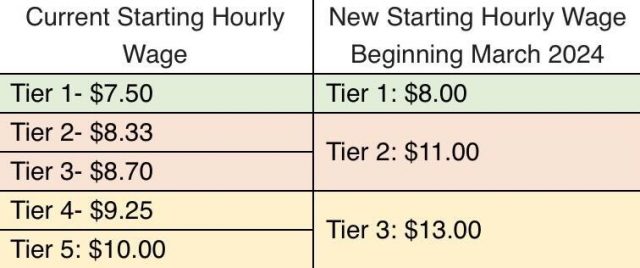On Thursday, Jan. 25, an increase in wages for hourly student workers was announced by Vice President for Finance and Administration Samir Datta via email. He said the change was the result of years of advocacy by students and the collective efforts of Lawrence University Community Council (LUCC), Finance, Student Life and Human Resources.
Lawrence, which currently operates on a tier system starting with tier one at $7.50 per hour and ending with tier five at $10 per hour, will switch to tier one at $8 per hour, two at $11 per hour and three at $13 per hour. According to LUCC President senior Anders Hanhan, jobs will be reclassified by the professional skills required and difficulty. Jobs where attention is only required at certain points and where one may choose how to spend one’s time will be classified as tier one, and jobs that require more professional skills will be classified as tier two or three.
Vice President of Student Life Chris Clarke noted that the restructuring will benefit the entire community. While it helps students financially and raises the wages, it also has a focus on examining the work and how these student jobs can be streamlined. According to Clarke, maximizing the opportunities and honing the responsibilities of each position will assist students in developing skills that can aid them for life after Lawrence.
Hanhan and LUCC General Secretary senior Cassie Lee similarly declared the positive impact this will have on students while holding out hope for continued attention and work put into keeping student wages equitable and competitive. The university is, for now, in the right range to be competitive, according to Datta.

According to Hanhan, this increase was the result of four years of student advocacy, beginning with the concerns of international students who were unable to work off campus, but were limited in hours and wages on campus. This led to expanded advocacy and work by LUCC members towards increasing wages. Compared to other colleges and local businesses, Hanhan claimed these rates were not competitive and negatively affected students struggling to make ends meet that do campus jobs, and it made it difficult to fill student worker positions.
Alongside this, Lee noted that many international students may have difficulties with exchange rates and acquiring the proper documentation to work. She said for many international students, work is a necessity, but it can be hard to judge how much pay is enough, or what is good. In her experience, while the increase and further increases in pay are useful and necessary, Lawrence can also increase its visibility in terms of how students are paid and what jobs are open.
“The campus can advertise more what jobs on campus there are for students—especially international students—to make use of, as well as communicate [about] the tier system,” said Lee. “International students have orientation, but they don’t mention what the tier system is or how much you get paid depending on the positions. So, I’d [like to see] more education and advertisements […] in the future.”
Hanhan expressed his full confidence in President-Elect junior Isabel Dorn and Vice-President Elect first-year Brooklyn Schara going forward. There is, according to Hanhan and Clarke, a current review of stipend-based positions, including Community Advisor and summer internship programs, which will likely be confirmed in the future, along with an increased general awareness across campus of student wages.
“This outcome is not perfect,” said Hanhan. “This outcome is not the end of this advocacy, but I’m not going to pretend that a 30–40% increase to student pay isn’t going to make a big difference in people’s lives, because it will. That 30–40% increase is huge […] Going forward, my hope is that LUCC continues to be primarily a tool for student advocacy. Now that we’ve addressed this issue for the first time in a long time at Lawrence, we have set up a platform for ongoing communication and checking in on a regular basis, and not letting us get this far behind in the future.”
